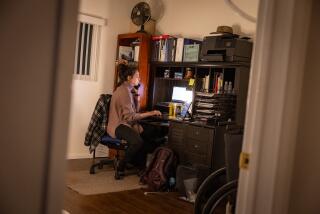Liver Patients Find Strength, Facts in Numbers
- Share via
THOUSAND OAKS — The running gag is that this is the club you do not want to belong to.
“How are you doing?” is more than idle small talk. Casual banter is as likely to include comparisons of life-saving medications as reviews of the latest hot movie.
The humor often takes a grim turn. After all, humor is the best defense when you are staring down death.
This is a support group for liver transplant patients and their caregivers. They meet Friday evenings over coffee at the Thousand Oaks Barnes & Noble, where the conversation and the company have become an important lifeline.
“It’s just a great group,” said one of the founders, Tony Anjoubault. “We’ve all had our ticket punched as either a patient or a caregiver.”
Anjoubault got his liver in 1991, after many years of battling hepatitis C, and went on to write a book about his experiences.
The book, “Running Against Time,” played a large part in bringing the group together.
It started last May, when Patty and Bob Corralejo were dealing with Bob’s fight with end-stage liver disease. Bob had to be transplanted twice because his first liver transplant failed. Patty found Anjoubault’s book and read it avidly.
“I was kind of desperate and we were just waiting and waiting [for the operation]. It was awful,” said Patty, who lives in Westlake Village.
She noticed that Anjoubault lived in Oak Park and, eager to talk to someone who understood what she and her husband were going through, Patty contacted Anjoubault and his wife, Anita.
The two couples got together over coffee and connected. A chance meeting between Patty Corralejo and Marrian Boniface brought Marrian and her husband, Allan Boniface, into the group. Marrian received her new liver in September 1995, also after years of dealing with hepatitis C.
Now, between 10 and 12 people gather every Friday evening to talk, laugh, empathize and share information.
Since joining the group, “I feel a lot calmer,” said Ed Blair, another hepatitis C patient, who is waiting to be called for his transplant. “You get to talk to people who’ve already had it done. You get this and you want to know what’s going on.”
“The support group now is very helpful,” said Dr. Leonard Goldstein, a UCLA physician who manages the care of transplant patients. “Doctors never give the patients the truth. There’s nothing like experience.”
When any liver disease reaches the end stages, the liver can no longer filter out toxins in the bloodstream that can cause jaundice, gum disease, skin problems, impaired vision and confusion. One of the worst complications is exhaustion.
For example, Blair can stay awake for only three to four hours at a time and now spends more time asleep than he does awake.
*
Members who underwent transplants before the group was formed say it would have been invaluable to have someone to reassure them about what to expect.
“It’s the loneliest feeling in the world when you leave that doctor’s office with bad news,” Anjoubault said.
Lack of knowledge can be the most frustrating part of the experience. It helps just to know that many of the complications that can occur are normal for their condition.
“I started having dental problems, yet the dentist had never heard of it,” Blair said. However, the group members were well aware of that symptom and gave him some tips.
The illness and surgery are also hard on the caregivers. If they are not already the breadwinners for their families, they are often forced to add that task, besides providing care, psychological support, child care and taking responsibility for doctor visits. And they have to deal with their own feelings of helplessness and worry.
“You’re watching your loved one slipping down the drain,” Anjoubault said.
“It can be frustrating to a caregiver,” Allan Boniface said, explaining that his wife’s illness often made her confused and irritable. “There’s a feeling ‘I’m not in control.’ It’s very difficult. You can’t do any more.”
*
Even though Boniface had a lot of support from his employer, as well as the couple’s friends and family, he thinks a support group would have made a big difference.
“For one thing, it would have been a lot clearer that these are manageable problems,” he said.
Most caregivers are husbands or wives who deal with the situation after a number of years of marriage, but the Anjoubaults married in 1980, while he was dealing with the early stages of his illness.
“She’s the main reason I’m alive,” Anjoubault said about his wife’s care. “The thing that’s so amazing is that [caregivers] have a choice. I was stuck with it. My wife married me knowing I was sick.”
“You definitely need support,” said group member Bill Solomon, who had hepatitis C and got his new liver in September 1995. “I think it would have been a lot less scary.”
Transplant patients face a lifetime of anti-rejection drugs, but the worst of the ordeal is behind them. Yet they stay in the group, saying they want to help those who are still waiting.
“It’s sort of about helping others and it makes you feel good, too,” Solomon said.
*
Lately, the group has been shifting to a more active role in transplant issues. Members decided they wanted to get more involved after the recent decision by United Network Organ Sharing, the national group overseeing the distribution of organ transplants, to give priority to those whose organs fail suddenly.
This means, for example, that when a liver becomes available, the patient who ate mushrooms will get priority over the hepatitis patient, even if the hepatitis patient is closer to death.
Support group members have begun a letter-writing campaign opposing this policy, but their primary focus remains on supporting each other.
“It’s social, but then again, you’re doing something that morally is important,” Anjoubault said.






